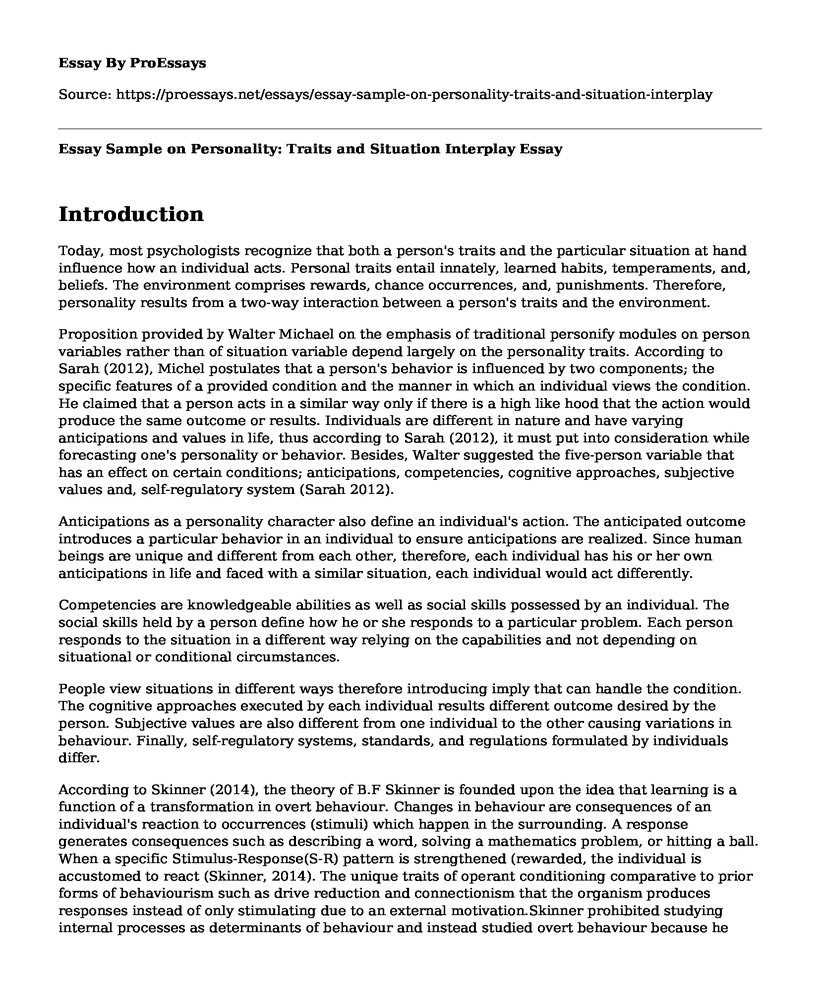Introduction
Today, most psychologists recognize that both a person's traits and the particular situation at hand influence how an individual acts. Personal traits entail innately, learned habits, temperaments, and, beliefs. The environment comprises rewards, chance occurrences, and, punishments. Therefore, personality results from a two-way interaction between a person's traits and the environment.
Proposition provided by Walter Michael on the emphasis of traditional personify modules on person variables rather than of situation variable depend largely on the personality traits. According to Sarah (2012), Michel postulates that a person's behavior is influenced by two components; the specific features of a provided condition and the manner in which an individual views the condition. He claimed that a person acts in a similar way only if there is a high like hood that the action would produce the same outcome or results. Individuals are different in nature and have varying anticipations and values in life, thus according to Sarah (2012), it must put into consideration while forecasting one's personality or behavior. Besides, Walter suggested the five-person variable that has an effect on certain conditions; anticipations, competencies, cognitive approaches, subjective values and, self-regulatory system (Sarah 2012).
Anticipations as a personality character also define an individual's action. The anticipated outcome introduces a particular behavior in an individual to ensure anticipations are realized. Since human beings are unique and different from each other, therefore, each individual has his or her own anticipations in life and faced with a similar situation, each individual would act differently.
Competencies are knowledgeable abilities as well as social skills possessed by an individual. The social skills held by a person define how he or she responds to a particular problem. Each person responds to the situation in a different way relying on the capabilities and not depending on situational or conditional circumstances.
People view situations in different ways therefore introducing imply that can handle the condition. The cognitive approaches executed by each individual results different outcome desired by the person. Subjective values are also different from one individual to the other causing variations in behaviour. Finally, self-regulatory systems, standards, and regulations formulated by individuals differ.
According to Skinner (2014), the theory of B.F Skinner is founded upon the idea that learning is a function of a transformation in overt behaviour. Changes in behaviour are consequences of an individual's reaction to occurrences (stimuli) which happen in the surrounding. A response generates consequences such as describing a word, solving a mathematics problem, or hitting a ball. When a specific Stimulus-Response(S-R) pattern is strengthened (rewarded, the individual is accustomed to react (Skinner, 2014). The unique traits of operant conditioning comparative to prior forms of behaviourism such as drive reduction and connectionism that the organism produces responses instead of only stimulating due to an external motivation.Skinner prohibited studying internal processes as determinants of behaviour and instead studied overt behaviour because he focused on the observable behaviour. He utilized consequences to validate the continuity of behaviour. Majority of internal processes are not visible. Secondly, his ideas originated from Thorndike law that emphasizes more on overt behaviour than the internal processes or arrangements. The law Thorndike states, "Behaviour that is followed by reinforcement, positive or the negative has an increased probability of reoccurrence. Behaviour followed by extinction or punishment has a decreased probability of re-occurrence" (Thorndike, 1927), the theory emphases more on external processes than internal.
References
Sarah Mae Sincero (Jul 19, 2012). Social Cognitive Theories of Personality. Retrieved
From: https://explorable.com/social-cognitive-theories-of-personality
Skinner, B. F. (2014). Contingencies of reinforcement: A theoretical analysis (Vol. 3). BF Skinner Foundation. Retrieved from: https://books.google.co.ke/books?hl=en&lr=&id=yLn6AwAAQBAJ&oi
Thorndike, E. L. (1927). The law of effect. The American journal of psychology, 39(1/4), 212-222.Retrieved from: https://www.jstor.org/stable/1415413
Cite this page
Essay Sample on Personality: Traits and Situation Interplay. (2023, Feb 12). Retrieved from https://proessays.net/essays/essay-sample-on-personality-traits-and-situation-interplay
If you are the original author of this essay and no longer wish to have it published on the ProEssays website, please click below to request its removal:
- Essay Sample on Ways to Success
- Adolescent Onset Conduct Disorder Case Study
- Aging in America - Paper Example
- Gordon Allport's Trait Theory of Personality Essay Example
- Essay Sample on Mixed Anxiety/Depression & Substance Use: Effective Diagnosis & Treatment
- Essay Sample on Stress: Benefits and Detriments to Mental and Physical Health
- Essay Example on Mental Illness: Challenges, Symptoms & Care Needed







